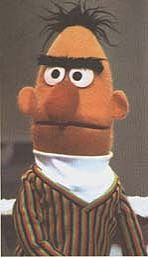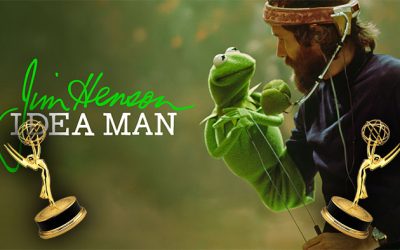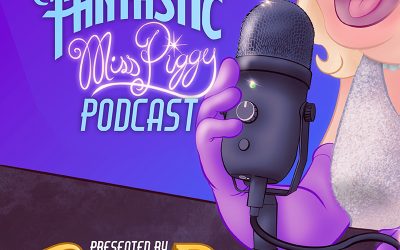 Ernie vs Bert
Ernie vs Bert
— Round 3 —
Mind Games
Here’s two classic Ernie and Bert sketches, circa the early-to-mid 70’s:
| [ Ernie and Bert’s apartment. Ernie is looking at a big green letter Q as Bert enters. ] | |
| Ernie
|
Hi, Bert! |
| Bert
|
Oh, hi, Ernie. |
| Ernie
|
Isn’t this a nice letter Q that I have here? |
| Bert
|
Oh, that’s what it is. Yeah, yeah, it’s nice. |
| Ernie
|
Yeah, see, it’s big and round there, and it’s got this little wiggly tail right there. |
| Bert
|
Right there. |
| Ernie
|
That’s how you can tell it’s a Q. |
| Bert
|
Yeah, it’s nice. |
| Ernie
|
Hey, Bert, you know what I have? |
| Bert
|
What? |
| Ernie
|
I have a very exciting game that we can play with this letter Q. |
| Bert
|
Oh, no, not me. |
| Ernie
|
You want to play an exciting game, Bert? |
| Bert
|
Nope. Not me. |
| Ernie
|
Oh, but this is a neat game. |
| Bert
|
Uh uh. |
| Ernie
|
You see, we can practice counting our numbers, and at the same time we’ll learn about the letter Q. |
| Bert
|
Ernie, you always trick me in these games, always. |
| Ernie
|
No, not this time, Bert. You see, this is how the game is played, see. I say One-Q — and I point to the letter Q. And then you say Two-Q — and you point to the letter Q. And it goes on like that. |
| Bert
|
Point, like that? |
| Ernie
|
That’s all there is to it. |
| Bert
|
That’s all, right? |
| Ernie
|
Mm hmm. It’s your kind of game, Bert. |
| Bert
|
That sounds kinda fun, actually. Okay. Do I start, or do you start? |
| Ernie
|
No, I’ll start. Okay. One-Q! |
| Bert
|
Uh, Two-Q! |
| Ernie
|
Three-Q! |
| Bert
|
Four-Q! |
| Ernie
|
Five-Q! |
| Bert
|
Six-Q! |
| Ernie
|
Seven-Q! |
| Bert
|
Eight-Q! |
| Ernie
|
Nine-Q! |
| Bert
|
Ten-Q! |
| Ernie
|
What’s that, Bert? |
| Bert
|
Ten-Q! |
| Ernie
|
I couldn’t hear you, Bert. |
| Bert
|
Ten-Q! Ten-Q! Ten-Q! |
| Ernie
|
You’re welcome, you’re welcome, you’re welcome, Bert! |
| [ Ernie laughs, and exits. Bert scratches his head. ] | |
| Bert
|
I don’t get it. |
| [ Ernie and Bert finish watching a cartoon on TV about the number 10. ] | |
| Ernie
|
(singing along) One, two, three, four, five, six, seven, eight, niiiiiine, ten! Oh, that counting stuff, Bert, y’know, that counting stuff reminds me of a great game I know. Wanna play a little game? |
| Bert
|
Aw, no. Not another one of your meatball games, Ernie. No thanks. |
| Ernie
|
Oh, no, no, Bert. This is not a meatball game. |
| Bert
|
No? |
| Ernie
|
I promise, this is not a meatball game. |
| Bert
|
No tricks? |
| Ernie
|
No tricks. No, no. |
| Bert
|
All right. |
| Ernie
|
It goes like this, see. I say, I one the sandbox. |
| Bert
|
Yeah? |
| Ernie
|
And then you say, I two the sandbox. |
| Bert
|
Yeah… |
| Ernie
|
And then I say, I three the sandbox. And so on and so forth, and on and on and on and on and on, and on, like that. Wanna play? |
| Bert
|
Nah, it’s stupid. |
| Ernie
|
No, no. It’s not stupid. |
| Bert
|
Oh, all right. |
| Ernie
|
Okay. Goes like this. I was walking down the street the other day, and I saw a sandbox. |
| Bert
|
Huh. |
| Ernie
|
I one the sandbox. |
| Bert
|
Mm. |
| Ernie
|
Now you. |
| Bert
|
Oh, now. Okay. I two the sandbox. |
| Ernie
|
I three the sandbox. |
| Bert
|
I four the sandbox? |
| Ernie
|
I five the sandbox… |
| Bert
|
I six the sandbox! |
| Ernie
|
I seven the sandbox! |
| Bert
|
I eight the sandbox! |
| Ernie
|
You ate the sandbox? |
| [ Ernie laughs and puts his arm around Bert’s shoulder. ] | |
| Ernie
|
How’d it taste, Bert? |
| Bert
|
Aww, no… |
| [ Ernie laughs. ] |
Color Commentary:
Now, I have no idea if these jokes were original to Sesame Street, or if they were already common schoolyard tricks that Ernie just appropriated. All I know is that by the time I was in elementary school, both of these jokes were in pretty common use, and they worked, pretty much all the way through second grade.
So there’s two options here. One is that these were already old chestnuts by the time Ernie and Bert came along. But the other option — and this is the one I prefer, myself — is that Ernie’s sense of humor is so perfectly attuned to the young child’s desire to dominate and control that the children of the world instinctively follow his lead.
Because you have to admit that impractical jokes like these are a fairly hostile form of gamesmanship. Ernie’s just humiliating Bert, really, for no good reason at all. In the case of the licorice whips, I suggested that Bert deserved to be treated badly, because he refused to stand up for himself. But in both of these sketches, Bert is suspicious from the start, and he refuses to play the games. In fact, he insists that the games sound stupid and contrived, and they do. He only gives in because Ernie bullies him into it — and then, as soon as the game gets going, Ernie plays his little trick, and Bert is left with egg on his face again.
Now, I’m not going to try to debate the morality of this little exercise. Clearly, there’s no moral justification for Ernie hatching these little humiliation schemes. The thing that I think is interesting is what all this demonstrates about the essentially hostile nature of schoolyard humor.
When you think about it, all the jokes that little kids tell are basically an attempt to trick other people. Riddles, knock-knock jokes, shaggy dog stories… they’re all tiny tricks, ways to surprise and unsettle other people. They’re like little experiments in using language to dominate people, a slightly more subtle version of the “made you look!” game.
Rough-and-tumble play is a way that kids test the limits of their physical powers — how high they can jump, how hard they can push, whether they can run fast enough to get away from someone chasing them. In a similar way, verbal play helps kids test their linguistic and social powers. When they tell jokes and play tricks, kids are testing out how to mislead, how to use words to make yourself stronger and your opponent weaker.
Ernie would never just walk up to Bert and push him down to the ground for no reason, just to laugh at him. Only a bully would push people around like that. But Ernie kind of does the same thing with words here, and somehow that’s okay.
Just like with the licorice whips, there’s an important lesson in here for kids. They don’t have to understand it explicitly, it just speaks directly to some hidden, anti-social desire deep in their selfish little hearts. The Sesame Street Muppets seem so sweet and funny; you’d never know they were feeding your darkest impulses. How’d it taste, Bert?
by Danny Horn



